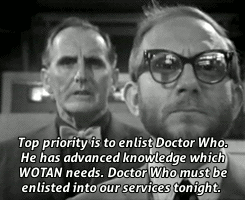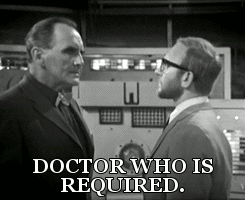Season 3, Episode 10 (Overall Series Story #27) | Previous - Next | Index
 |
| Image via Doctor Who GIFs |
The Singularity in contemporary popular culture probably conjures images of human coppertops, enslaved by their machine overlords, pacified by the illusion of freedom. For example, The Matrix is a blend of biological and existential horror: technology has penetrated our flesh, our identities hijacked and subverted. An alternate strain of Singularity apprehension might be fear of a human who is able to inject their humanity into an advanced computer and thereby gain supernatural abilities and alter reality; Transcendence, even Lucy (although the expanded human consciousness with super powers is a pharmacological phenomenon, not a technological) tap into this fear of the people with power, afforded by the ability to bend reality to their will, leaving the rest of humanity vulnerable against those whom they are powerless to resist.
A little farther back (though perhaps also in the near future), The Terminator movies represent a link to what we might think of as link to a more 1950's, Cold War-inspired fear of totalitarianism. Skynet has taken control, but it hasn't threatened the nature of humanity, only it's survival. Skynet uses powerful androids as shock troops against humanity, cousins of old black & white sci-fi B-movie lumbering robots carrying off our womenfolk. This common thread between early Cold War and late Cold War nightmares lead directly to questioning whether the 1980's were the new 1950's -- the cultural '50s which ended with the Kennedy assassination? The last gasp of the Cold War harkening back to its heyday? Miami Vice pastels replacing the sun-saturated color palette of cool blues and greys we associate with the Kennedy home movies? The emergence of hip-hop paralleling the early days of rock-n-roll as the music outlet ofrestless youth? Neo-conservatism the country cousin of the cosmopolitan neo-liberalism that claimed Western democracy after WWII?
No, it's too glib and facile a comparison to be of any use. Ronald Reagan wasn't JFK, Iran-Contra wasn't the Cuban Missile Crisis, and let's face it, the 1950's we imagine -- James Dean, Marilyn Monroe, Elvis Presley, peaceful, wholesome white-bread prosperity marred only slightly by McCarthyism and nightmares of nuclear mushroom clouds -- weren't the real 1950's either. Vicious cultural and institutional racism, labor strife, a Cold War that was hot enough for those living in the conflict zones between competing forms of capitalism.* Eisenhower's warning against the military-industrial complex wasn't prophecy, it was simply an observation of a state of affairs becoming comfortably entrenched. The Reagan wasn't the fusion of Eisenhower and Kennedy, he was Nixon in an era when marketing had advanced to the point Nixon could me made to look Kennedy-esque.
But, I digress ...
Doctor Who, taking on the rise of the machine from those years between the JFK assassination (famously, the same day as the debut of "An Unearthly Child") and the Summer of Love, has one foot in forward-looking, connected super-computer Singularity futurism (tenuously) and the other (firmly) rooted in the old-fashioned, B-movie cheap thrills of the giant robots. The series emerges from an exact moment of cultural trauma with a desire to hold onto the virtues of the mythic past, and a wary eye towards the inexorable future. Crucially, for it's long term survival, the series chiefly approaches this new future with a spirit of openness. It is a model of bravery in the face of the alien, curiosity over fearfulness ... but, it was also teetering on the verge of cancellation because "The War Machines" was about the best it could at this stage, and its best very nearly wasn't good enough.
William Hartnell's Doctor, the cantankerous grandfatherly figure, rooted in the ideal of the Victorian gentleman scientist, is coming down the homestretch -- a new Doctor for the next era waits in the wings. Ben and Polly join here, but they're properly Troughton-era companions presaging Hartnell's departure. Ben is a younger, working class chap a significant change from Steven, and from Ian before him, in that he's also a bit of an asshole. We like him for a moment when he peels a cad off Polly in the nightclub but he turns insufferable immediately thereafter. Polly has her moments, but she's such stereotype it's difficult to watch her long. At least she's more personable that Ben. It's just not saying much. There are at least two instances of Ben having to wrangle a hypnotized Polly where it looks for all the world like he's taking a cad's opportunity to grope her tits. During one scene, I found myself rolling my eyes and muttering, "Really, Ben?! Really?"
This story is littered clunky absurdities and the ludicrous. The titular War Machines themselves, for one. The new Daleks, they most certainly aren't. WOTAN knows what the TARDIS is, or at least what the acronym stands for, but doesn't know the Doctor isn't human? The U.S. has agreed to turn their computer systems over to a British super-computer nobody seems to know very much about? Perhaps worst of all, WOTAN has has the strange delusion that the Doctor is called Doctor Who? Anyone looking to make the case the name of the Doctor could be filled out on a mortgage application form as 'Surname: Who, First Name: Doctor, Middle Initial: N/A' will find all the ammunition they need for their argument here. But, I stand by my assertion that is a mistake and never should have made it to screen. If anything is handled less well than the naming issue, it's Dodo's departure. Packed off to the country to recover from being hypnotized, she never even gets a farewell scene, just a mention at the end that, oh yeah, she's not coming back.
 |
| Image via Doctor Who GIFs |
 |
| Image via A Year With the Doctor |
* A more accurate framing, I think, of the conflict between the corrupt full flower of state-owned business that was the Soviet Union and the budding corrupt corporate-owned government of the United States, which achieved full flower under Reagan